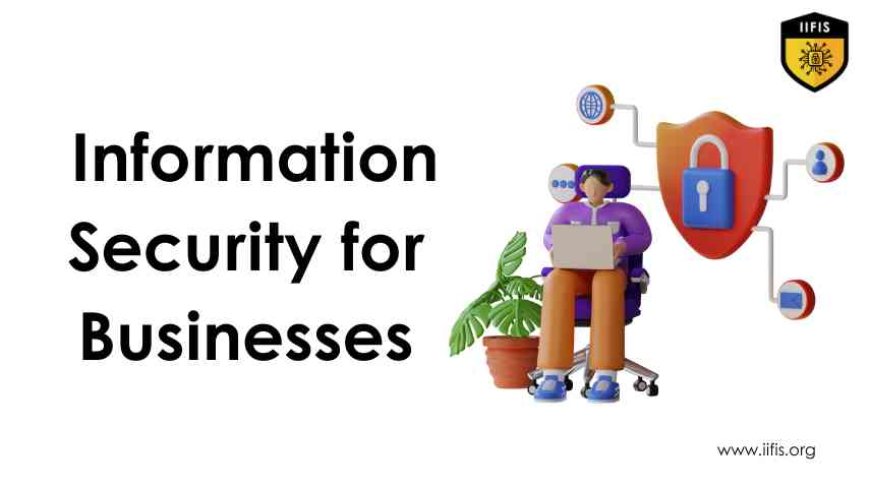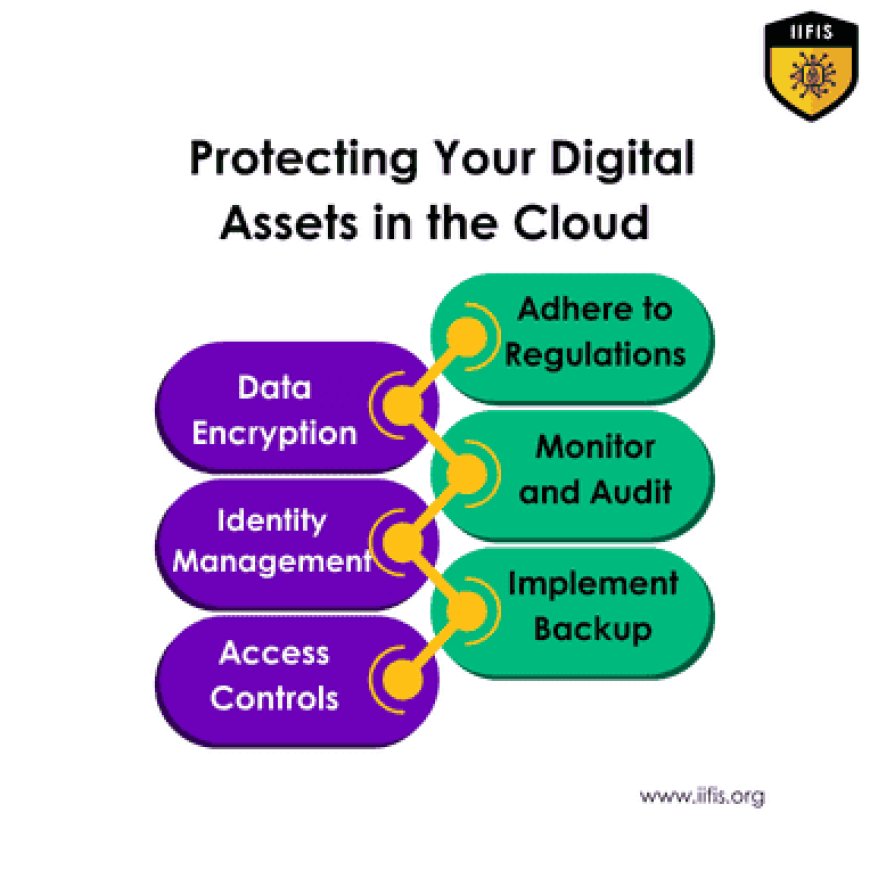Types of Information Security for Businesses
Explore the essential types of information security for businesses, including network security, endpoint security, application security, cloud security, and data security. Learn about key measures and real-world applications to protect your business from various threats.

Businesses are increasingly at risk from a variety of cyber threats. Companies must implement different types of information security measures to protect sensitive data and maintain operational integrity. Network security protects the infrastructure from unauthorized access, malware, and cyber-attacks. Application security protects software and devices from potential weaknesses. Data security ensures that confidential business information remains protected from violations, theft, and leaks. Businesses also employ cloud security measures to secure data stored in cloud environments. Each type of security plays a critical role in protecting business assets in an evolving threat world.
Network Security: Safeguarding Business Infrastructure
Explanation and Importance
Network security involves protecting an organization's network infrastructure from unauthorized access, misuse, and cyber threats. It is crucial for maintaining the confidentiality, integrity, and availability of data transmitted across the network. Without robust network security measures, businesses are vulnerable to attacks that could lead to data breaches, financial losses, and damage to their reputation.
Key Measures
-
Firewalls: Firewalls act as barriers between a trusted internal network and untrusted external networks. They filter incoming and outgoing traffic based on predefined security rules, helping to block malicious activity and unauthorized access.
-
Encryption: Encryption converts data into a secure format that can only be read by authorized users. This ensures that sensitive information remains confidential even if intercepted during transmission.
-
VPNs (Virtual Private Networks): VPNs create secure, encrypted connections over public networks, allowing employees to access the business network safely from remote locations. This is particularly important for businesses with remote or distributed teams.
Benefits
Securing networks from external threats provides numerous benefits, including:
-
Protection of Sensitive Data: Safeguards confidential information from unauthorized access and violations.
-
Prevention of Financial Losses: Reduces the risk of costly cyber-attacks and financial penalties resulting from data violations.
-
Enhanced Operational Integrity: Ensures that network resources remain available and reliable, minimizing disruptions to business operations.
-
Improved Trust and Reputation: Demonstrates a commitment to cybersecurity, predicting trust among clients and partners.
Endpoint Security: Protecting Individual Devices
Definition and Relevance
Endpoint security refers to the protection of individual devices, such as laptops, smartphones, and tablets, that connect to a business's network. These endpoints are often the entry points for cyber threats, making endpoint security a critical component of an organization's overall security strategy. By securing these devices, businesses can protect sensitive data and prevent unauthorized access.
Key Measures
-
Antivirus Software: Antivirus programs scan devices for malicious software and threats, providing real-time protection against viruses, malware, and other harmful entities. Regular updates ensure that the software can detect and neutralize the latest threats.
-
Patch Management: Keeping software and operating systems up to date is essential for closing security vulnerabilities. Patch management involves applying updates and patches to fix known issues and enhance device security.
-
Device Control: Implementing policies for controlling which devices can access the network helps prevent unauthorized or potentially insecure devices from compromising the system. This can include setting restrictions on USB ports or implementing device encryption.
Impact of Remote Work
The rise of remote work has significantly customized endpoint security needs. With employees accessing corporate networks from various locations and devices, ensuring that these endpoints are secure becomes even more crucial. Businesses must adapt their endpoint security strategies to account for:
-
Increased Attack Surface: More devices and remote connections can create additional weaknesses.
-
Diverse Environments: Endpoints may be used in less controlled environments, such as home networks, which could have weaker security measures.
-
Enhanced Monitoring Needs: Continuous monitoring and management are necessary to protect against potential threats in a remote work setup.
Addressing these challenges effectively can help businesses maintain robust endpoint security and protect their sensitive data from evolving cyber threats.
Application Security: Safeguarding Business Software
Importance
Application security is critical for protecting software applications that businesses rely on for their operations. These applications, whether they are web-based, mobile, or desktop applications, often handle sensitive data and perform essential functions. Without sufficient security measures, weaknesses in these applications can be exploited by attackers, leading to data breaches, financial losses, and damage to a company’s reputation.
Key Measures
-
Code Reviews:Regular code reviews involve examining the source code for vulnerabilities, bugs, and security flaws. This process helps identify potential issues early, allowing developers to address them before the application is deployed.
-
Penetration Testing:Penetration testing simulates real-world attacks on an application to uncover vulnerabilities that could be exploited by malicious actors. This proactive approach helps organizations understand their security weaknesses and strengthen their defenses.
-
Secure Coding Practices:Secure coding involves following best practices and guidelines to write code that minimizes weaknesses. This includes input validation, proper error handling, and secure authentication methods to protect against common threats like SQL injection and cross-site scripting.
Role in Preventing Data Breaches
Application security plays a crucial role in preventing data breaches by ensuring that software applications are resilient against attacks. By implementing strong security measures, businesses can:
-
Reduce weaknesses: Address potential weaknesses in the application code and architecture before they can be taken advantage of.
-
Enhance Data Protection: Safeguard sensitive information from unauthorized access and leaks.
-
Maintain Compliance: Meet regulatory requirements and industry standards for data protection.
Effective application security measures help ensure that software applications operate securely and that business data remains protected from emerging threats.
Cloud Security: Protecting Your Digital Assets in the Cloud
Rising Importance
As businesses increasingly migrate to cloud environments, the importance of cloud security has risen dramatically. The cloud offers scalable and flexible resources, but it also introduces unique security challenges. Ensuring robust cloud security is essential to protect sensitive data, maintain business continuity, and safeguard against cyber threats in these virtual environments.

Key Measures
-
Data Encryption: Encryption is crucial for protecting data both in transit and at rest in the cloud. By encoding data, encryption ensures that only authorized users can access and interpret sensitive information, reducing the risk of unauthorized access.
-
Identity Management: Identity and access management (IAM) tools control who can access cloud resources and what actions they can perform. Implementing strong authentication mechanisms, such as multi-factor authentication (MFA), helps verify user identities and prevent unauthorized access.
-
Access Controls: Fine-grained access controls regulate permissions for users and applications within the cloud environment. By setting up role-based access controls (RBAC) and least privilege principles, businesses can limit access to sensitive data and resources based on specific roles and needs.
Ensuring Compliance and Safeguarding Data
Ensuring compliance with industry regulations and standards is a critical aspect of cloud security. Businesses must:
-
Adhere to Regulations: Comply with data protection regulations like GDPR, HIPAA, or CCPA to avoid legal issues and penalties.
-
Monitor and Audit: Regularly monitor and audit cloud environments to detect and respond to security incidents promptly.
-
Implement Backup and Recovery: Establish robust backup and disaster recovery plans to safeguard cloud-stored data against loss or corruption.
By focusing on these key areas, businesses can effectively protect their cloud-based assets and maintain a secure and compliant cloud environment.
Data Security: Safeguarding Sensitive Business Information
Protecting Data at Rest and in Transit
Data security is essential for protecting sensitive business information, both while it is stored (at rest) and during transmission (in transit). Effective data security measures ensure that confidential data remains secure from unauthorized access, breaches, and other cyber threats, thereby maintaining the integrity and confidentiality of business information.
Key Measures
-
Data Encryption: Encryption transforms data into a secure format that can only be read by those with the decryption key. This protects data both at rest (e.g., in databases or file systems) and in transit (e.g., during transmission over networks), ensuring that even if data is intercepted or accessed without authorization, it remains unreadable.
-
Tokenization: Tokenization replaces sensitive data with unique identifiers or tokens. These tokens have no intrinsic value and can only be mapped back to the original data through a secure tokenization system. This reduces the risk of data breaches by minimizing exposure of sensitive information.
-
Access Restrictions: Implementing strict access controls ensures that only authorized personnel can access sensitive data. This includes setting permissions based on roles, enforcing strong authentication methods, and regularly reviewing access rights to prevent unauthorized access.
Importance in Maintaining Business Integrity
Data security plays a critical role in maintaining business integrity by:
-
Protecting Confidential Information: Ensures that sensitive business data remains confidential and is only accessible to authorized individuals.
-
Preventing Data Breaches: Mitigates the risk of unauthorized access and data breaches, which can lead to financial losses and damage to reputation.
-
Ensuring Compliance: Helps businesses comply with legal and regulatory requirements related to data protection, avoiding potential legal consequences.
By implementing strong data security measures, businesses can protect their valuable information, uIdentity and Access Management (IAM): Protecting Company Resources
Securing Access with Strong Authentication
IAM systems ensure that only authorized individuals access company resources by using strong authentication methods. This prevents unauthorized access and potential security breaches.
Key Components
-
Multi-Factor Authentication (MFA): MFA requires users to provide multiple forms of verification—such as a password, a smartphone token, and biometric data—adding extra security layers.
-
Role-Based Access Control (RBAC): RBAC grants access based on user roles, ensuring that individuals only access resources necessary for their job functions.
Role of IAM
IAM helps verify user identities, enforce access policies, and monitor activities, protecting against unauthorized access and maintaining a secure environment.
uphold their integrity, and maintain trust with clients and partners.
Physical Security: Safeguarding Devices and Facilities
Securing Devices and Premises
Physical security protects hardware and facilities from theft and unauthorized access.
Key Measures
-
Surveillance: Cameras monitor and deter unauthorized activity.
-
Access Control: Key cards and biometrics restrict entry to authorized personnel.
-
Secure Facilities: Locked doors and safes protect sensitive areas.
Integration
Combining physical security with digital measures ensures comprehensive protection of all business assets.
Protecting your business requires a multi-layered approach to information security, including network, endpoint, application, cloud, and data security. Regularly updating and reviewing your security practices is crucial to staying ahead of threats. Institutions like IIFIS can provide valuable resources and training to strengthen your security measures.






















